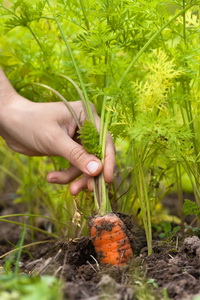
Researchers Apply CRISPR-Cas9 on Carrot Cells
January 24, 2018| |
 CRISPR-Cas9 is widely adopted in model organisms, but has not been used in carrot, an important health-promoting crop grown worldwide. Magdalena Klimek-Chodacka of the University of Agriculture in Krakow in Poland, and colleagues, reported the use of CRISPR-Cas9 for targeted mutagenesis of carrot.
CRISPR-Cas9 is widely adopted in model organisms, but has not been used in carrot, an important health-promoting crop grown worldwide. Magdalena Klimek-Chodacka of the University of Agriculture in Krakow in Poland, and colleagues, reported the use of CRISPR-Cas9 for targeted mutagenesis of carrot.
Several CRISPR-Cas9 vectors that contain two single-guide RNA (gRNAs) that target the carrot flavanone-3-hydroxylase (F3H) gene were tested to block the anthocyanin synthesis in a purple-colored carrot callus. Knockout of F3H gene resulted in discoloration of calli, proving the role of F3H gene in carrot anthocyanin synthesis. This also provided a visual proof for screening successfully edited events.
This study shows the successful site-directed mutagenesis in carrot using CRISPR-Cas9 and could spark research in this important vegetable crop.
For more information, read the article in Plant Cell Reports.
| |
Biotech Updates is a weekly newsletter of ISAAA, a not-for-profit organization. It is distributed for free to over 22,000 subscribers worldwide to inform them about the key developments in biosciences, especially in biotechnology. Your support will help us in our mission to feed the world with knowledge. You can help by donating as little as $10.
-
See more articles:
-
News from Around the World
- Nigerian Farmers May Soon Plant Bt Cowpeas
- Scientists Recommend Bt Maize as Solution to Fall Armyworm Infestation in Kenya
- U.S. FDA Approves China's GE Rice
- Study Finds that Hormone Keys Plant Growth or Stress Tolerance, But Not Both
- Plant Biologists Develop Synthetic Auxin to Understand Plant's Mysteries
- Scientists Find "Thermostat" in Plant Immunity
- Wild Rice from Crocodile-Infested Waters in Australia May Help Boost Global Food Security
- Study Reveals More Genes are Active in High-Performance Maize
- EU Court of Justice Advocate General Says Gene Edited Crops Should be Exempted from GM Food Laws
-
Research Highlights
- Apple Protein MdY3IP1 Triggers Early-Flowering and Salt-Tolerance in Arabidopsis
- Scientists Reveal the Role of SlJAZ2 in Tomato
-
Beyond Crop Biotech
- CmHSFA4 Positively Regulates Salt Stress Tolerance in Transgenic Chrysanthemum
-
Announcements
- 5th International Rice Congress
-
Plant
- Optimized CRISPR-Cas9 Induces Targeted Mutation in Kiwifruit
- Researchers Apply CRISPR-Cas9 on Carrot Cells
-
Read the latest: - Biotech Updates (October 29, 2025)
- Gene Editing Supplement (October 29, 2025)
- Gene Drive Supplement (February 22, 2023)
-
Subscribe to BU: - Share
- Tweet
